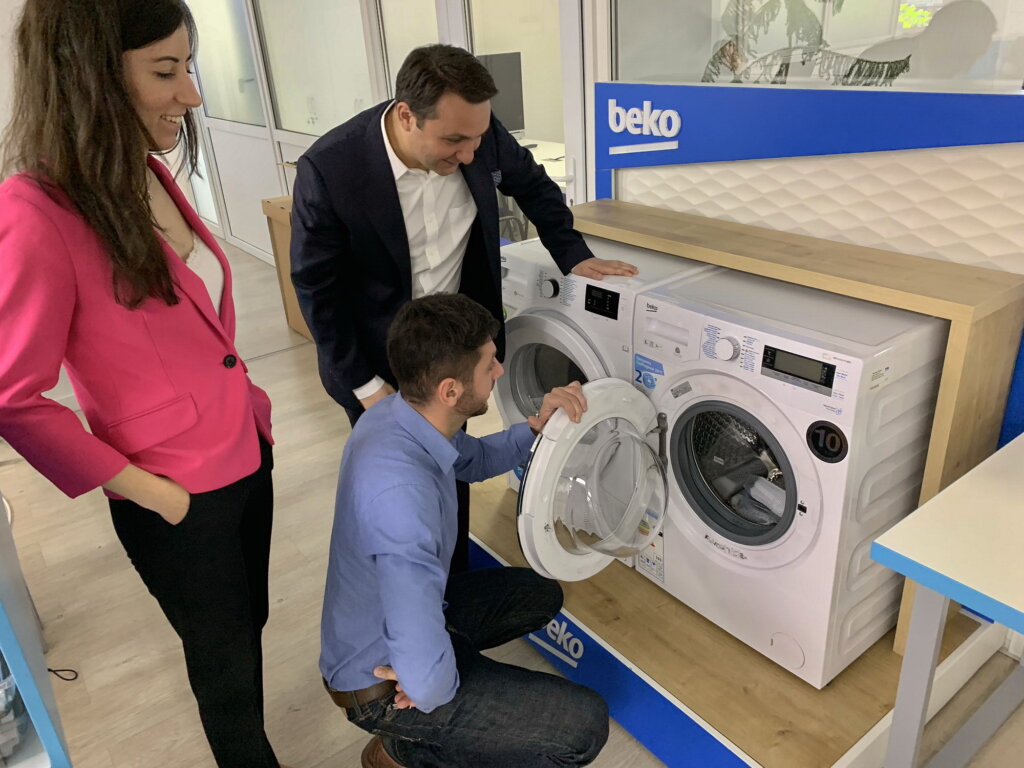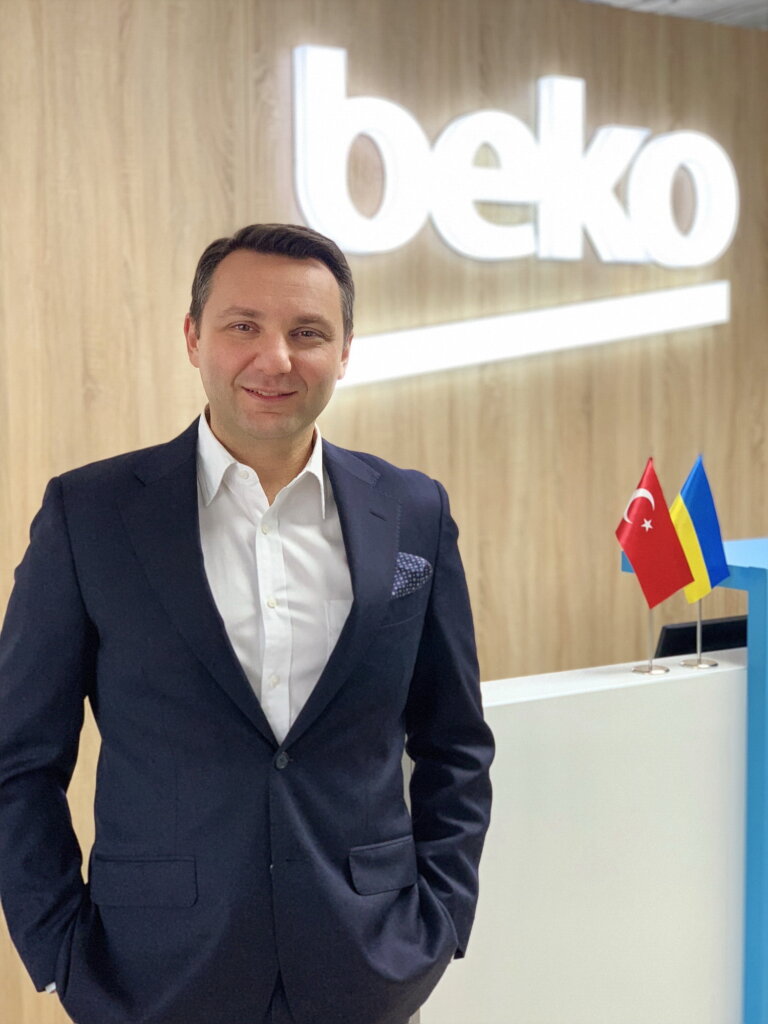One of Europe’s best-selling home appliance brands Beko is satisfied with its business in Ukraine.
Ukraine is young, dynamic and success-oriented — and many foreign companies are eager to invest in the country, according to Alp Arbatli, 43, Beko’s country manager in Ukraine.
However, when Arbatli was appointed the country manager for Beko in 2018, he thought Ukraine would be a difficult market because of the high levels of corruption, political instability and ongoing crisis that many of his business partners had warned him about.
“But when I came here, I found something different,” said Arbatli, who previously worked for 11 years at Beko’s parent company Arcelik and Beko’s U.S. branch for nearly two years.
Beko opened a Ukrainian branch in 2012, eventually growing it into two warehouses and a Kyiv office. It lived through the hardships of the EuroMaidan Revolution and the subsequent economic downturn. Arbatli wouldn’t disclose any of the company’s financial results in Ukraine, saying only that Ukraine has always been “an important market.”
And even though Arbatli thinks Ukraine’s economy has almost recovered from the crisis, there are still issues that the local government has to resolve to ramp up trade with other countries. For Beko, eliminating gray import and simplifying certification procedures for imported electronics are the most vital issues.

Beko Ukraine head Alp Arbatli (C) looks at a washing machine produced by Beko. The Turkish brand entered Ukraine in 2013. The company manufactures household appliances and supplies them to Ukraine from its factories in Turkey, Romania and Russia. As for now, Beko employs 35 Ukrainians that work from the main office in Kyiv. (Courtesy of Beko)
Turkish businesses in particular, including Beko, are waiting for Ukraine and Turkey to sign a free trade agreement — which the countries have been negotiating since 2012. The agreement is expected to greatly reduce taxes for imports and will be “the cherry on the cake,” Arbatli said.
Turkey is a big trade partner for Ukraine — the trade volume between the two countries amounted to $4.8 billion in 2019 and continues growing by 15–20% even during the pandemic, according to Gennadiy Chizhikov, head of the Ukrainian Chamber of Commerce and Industry.
If the countries sign a free trade agreement, the trade volume is expected to increase to nearly $10 billion. For businesses and investors, it will be a big milestone, Arbatli said.
Business in Ukraine
During the coronavirus pandemic that put millions of people under lockdown, the demand for home appliances has increased. The Ukrainian electronics market has grown by 13% since February, according to a survey the market research institute GfK published on June 1.
Beko Ukraine has seen a striking increase in sales, too. According to Arbatli, people didn’t spend money on traveling amid the pandemic and opted to invest in their houses, even in products like dishwashers and clothes driers, which were always undervalued in Ukraine and deemed as “too luxurious.” However, he didn’t offer any figures demonstrating Beko’s sales increase.
Arbatli believes that the changes in local consumers’ behavior will produce the further growth for the company. At the moment, however, it is hard to keep up with demand. The company’s factories in Turkey, Romania, and Russia — the ones that supply to Ukraine — simply can’t produce enough electronics to satisfy Ukraine’s demand during the pandemic.
The old problems remain, too. The unstable economy is one of them. Arbatli said the currency fluctuations — when $1 is worth Hr 24 in January and Hr 28.8 in October — make it hard to run an international business.
The tedious certification process for electronics is tiring too. According to Arbatli, when goods that are certified in the European Union are imported to Ukraine, they still need additional certification. “It is an easy process, but requires time and extra money,” Arbatli said.
Another problem that is prevalent in Ukraine is gray imports — when branded products are smuggled from other countries without the awareness of the official manufacturer. One of the problems with gray electronics is that they do not come with a warranty to protect the consumer, although they are cheaper.
“Beko is a branded product and our brand is valuable, so gray import is hurting our image a lot,” Arbatli said.
Apart from hurting Beko, gray imports hurt Ukraine — the country doesn’t receive up to $3.3 billion in taxes a year.
At the same time, Arbatli said, it is hard to find a market with no problems. In general, the company is satisfied with its Ukrainian branch. “We are here to sustain a healthy business and improve the country’s economy,” he said.

Beko Ukraine head Alp Arbatli, a Turkish citizen, poses for a picture in the company’s Kyiv office. Arbatli has been in charge of the company’s Ukrainian branch since 2018. (Courtesy of Beko)
Growing competition
The competition on the Ukrainian market of home appliances is high because there are other international brands that offer their goods at affordable prices.
And Ukraine is getting more local manufacturers that produce in Ukraine — or in China — and may dump the price, according to Vyacheslav Sklonny, the commercial director of Ukrainian electronics retailer Foxtrot.
Ukrainian home appliance makers like Mirta, Saturn and Stinex produce quality products that meet the demands of local consumers and can be exported abroad, but such companies still make up less than 5% of the Ukrainian home appliances market, said Olexander Velichko, who leads the department of electronics at Epicentr K, a chain of stores that specializes in home and garden supplies.
Beko Ukraine said that it enjoys competition, but it’s getting harder to get the attention of local consumers as new companies enter the market.
The Ukrainian retailers Epicentr K and Foxtrot said that Beko has a good reputation in Ukraine becuase it sells high-quality products — refrigerators, washing machines, driers, dishwashers, and ovens — at moderate prices.
The most expensive LG or Bosch refrigerators, for example, cost over $1,500. Ukrainian manufacturer Saturn sells its most expensive refrigerators for less than $360. With about a $1,000 price for its most expensive refrigerator, Beko tries to be the golden middle.
Arbatli said that this is exactly what the company stands for in Ukraine.
“We want to democratize the product and show that high quality is not for rich people only — anybody can get the latest technology,” he said.
